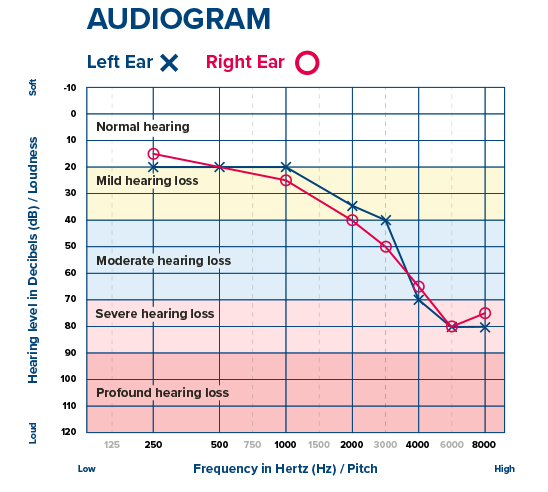
Degree of hearing loss
If you suspect that you might have some degree of hearing loss, you are probably wondering how serious it is. This page will educate you about the different levels of hearing loss and how you seek treatment, no matter what level of hearing loss you may have.
Compare degrees of hearing loss
The severity of your hearing loss is usually measured in two ways:
- Loudness: How loud does a sound need to be in order for you to hear it?
- Pitch: Which frequencies are difficult for you to hear?
Below are the main categories for hearing loss levels with examples of sounds that might be inaudible at a given level (based on their loudness and pitch.)
Degrees of hearing loss
The degree of hearing loss refers to the severity of the loss and is generally categorized as either mild, moderate, severe, or profound.
It can be measured in decibels (dB), referring to how loud sounds need to be for you to hear them.
Sounds you are missing
no sounds missing
Sounds you are missing Ticking clock
Sounds you are missing Vacuum cleaner
Sounds you are missing
Baby crying
Sounds you are missing
Airplanes
3 ways to understand the severity of your hearing loss
Reading an audiogram
An audiogram is a graph or chart that displays the results of your comprehensive hearing evaluation.
The X-axis shows the different pitches of the sounds that were played to you during your test. This axis is laid out like piano keys, where low-pitched sounds are on the left and higher pitches are towards the right of the graph.
The Y-axis shows the loudness which increases as you go down the graph. The points on the graph demonstrate how loud the sounds needed to be in order for you to hear at each pitch test.
Circles (red) symbolize your right ear and crosses (blue) symbolize your left ear.
Book a free hearing test to receive your own audiogram results.


Seek early treatment for hearing loss
Gradual hearing loss is fairly common in the aging process. But this doesn't mean that it should be ignored!
People with hearing loss are more likely to develop cognitive decline, and other consequences of untreated hearing loss.
Early identification of hearing loss is important for timely intervention and treatment.
Treating all degrees of hearing loss
If you think you have hearing loss, but you've been putting off getting a hearing aid, you're not alone.
Only 1 in 4 people who could benefit from hearing devices actually use them
While taking the first step can be the hardest part, seeking treatment as soon as possible is in your best interest. The Scripps Research Institute has found that hearing loss, when left undiagnosed or untreated, has the potential to worsen over time. Being proactive in seeking treatment in the early stages of hearing loss is therefore beneficial for both your current and long-term hearing health.
5 steps to improving your hearing
Invisible hearing solutions
Today’s hearing aids are more technologically advanced than ever - and they are also more discreet than ever.
Some modern hearing aids are practically invisible, and yet they still offer excellent sound quality even in difficult listening situations.
|









